
Peter Philip Carey AO is an Australian novelist.
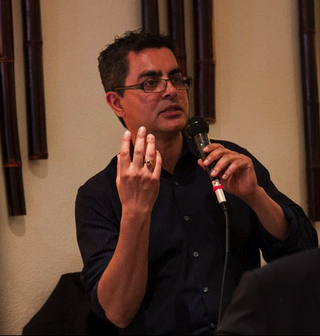
Amitava Kumar is an Indian writer and journalist who is Professor of English, holding the Helen D. Lockwood Chair at Vassar College.

Nigerian literature may be roughly defined as the literary writing by citizens of the nation of Nigeria for Nigerian readers, addressing Nigerian issues. This encompasses writers in a number of languages, including not only English but Igbo, Urhobo, Yoruba, and in the northern part of the county Hausa and Nupe. More broadly, it includes British Nigerians, Nigerian Americans and other members of the African diaspora.
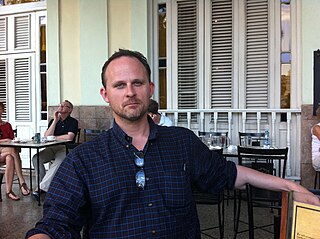
John Jeremiah Sullivan is an American writer, musician, teacher, and editor. He is a contributing writer for The New York Times Magazine, a contributing editor of Harper's Magazine, and the southern editor of The Paris Review. In 2014, he edited TheBest American Essays, a collection in which his work has been featured in previous years. He has also served on the faculty of Columbia University, Sewanee: The University of the South, and other institutions.

Francine Prose is an American novelist, short story writer, essayist, and critic. She is a visiting professor of literature at Bard College, and was formerly president of PEN American Center.
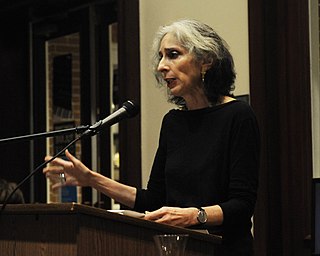
Deborah Eisenberg is an American short story writer, actress and teacher. She is a professor of writing at Columbia University.

Dinaw Mengestu is an Ethiopian-American novelist and writer. In addition to three novels, he has written for Rolling Stone on the war in Darfur, and for Jane Magazine on the conflict in northern Uganda. His writing has also appeared in Harper's, The Wall Street Journal, and numerous other publications. He is the Program Director of Written Arts at Bard College. In 2007 the National Book Foundation named him a "5 under 35" honoree. Since his first book was published in 2007, he has received numerous literary awards, and was selected as a MacArthur Fellow in 2012.

Okechukwu "Okey" Ndibe is a novelist, political columnist, and essayist of Igbo ethnicity. Ndibe was born in Yola, Nigeria. He is the author of Arrows of Rain and Foreign Gods, Inc., two critically acclaimed novels published in 2000 and 2014 respectively.
Sarah Ladipo Manyika FRSL is a British-Nigerian writer of novels, short stories and essays and an active member of the literary community, particularly supporting and amplifying young writers and female voices. She is the author of two well-received novels, In Dependence (2009) and Like A Mule Bringing Ice Cream To The Sun (2016), as well as the non-fiction collection Between Starshine and Clay: Conversations from the African Diaspora (2022), and her writing has appeared in publications including Granta, Transition, Guernica, and OZY, and previously served as founding Books Editor of OZY. Manyika's work also features in the 2019 anthology New Daughters of Africa.

Taiye Selasi is an American writer and photographer. Of Nigerian and Ghanaian origin, she describes herself as a "local" of Accra, Berlin, New York and Rome. In 2005, Selasi published "Bye-Bye, Babar ", her seminal text on Afropolitans. Her novel, Ghana Must Go, was published by Penguin in 2013.
Afropolitan is a term constructed from the name Africa and the ancient Greek word πολίτης ('politis'), meaning 'citizen'. It is an attempt at redefining African phenomena by, on the one hand, placing emphasis on ordinary citizens' experiences in Africa and, on the other hand, reconceptualizing the African Diaspora's relationship with the African continent. Afropolitanism is used and defined in various ways. The novelist Taiye Selasi and the political theorist Achille Mbembe are immediately associated with the coinage of the term and its fundamental theorization.
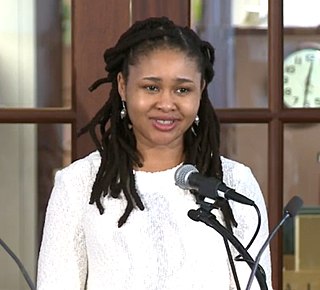
Chinelo Okparanta is a Nigerian-American novelist and short-story writer. She was born in Port Harcourt, Nigeria, where she was raised until the age of 10, when she emigrated to the United States with her family.

"Je suis Charlie" is a slogan and logo created by French art director Joachim Roncin and adopted by supporters of freedom of speech and freedom of the press after the 7 January 2015 shooting in which twelve people were killed at the offices of the French satirical weekly newspaper Charlie Hebdo. It identifies a speaker or supporter with those who were killed at the Charlie Hebdo shooting, and by extension, a supporter of freedom of speech and resistance to armed threats. Some journalists embraced the expression as a rallying cry for the freedom of self-expression.

Ghana Must Go is the debut novel of Taiye Selasi. It was published in 2013, and nominated for an NAACP Image Award. The novel follows the Sai family as they come to terms with their father Kweku Sai's death, and as they work through family troubles. Multiple points of view give insight into the characters' emotions and the repercussions of Kweku’s choices. The Wall Street Journal praised it as "irresistible from the first line".
Every Day Is for the Thief is a 2007 novel by Nigerian-American author Teju Cole. The unnamed protagonist of the novel returns to Lagos after fifteen years in New York City, only to find himself changed by living abroad and confused by the city. The novel was first published in Nigeria, but was later republished in the United States.
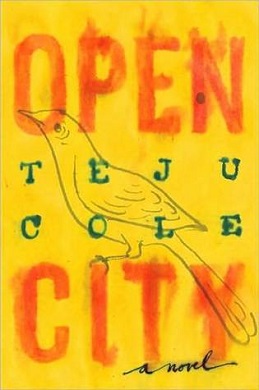
Open City is a 2011 novel by Nigerian-American writer Teju Cole. The novel is primarily set in New York City, and concerns a Nigerian immigrant, Julius, who has recently broken up with his girlfriend. The novel received praise for its prose and depiction of New York.
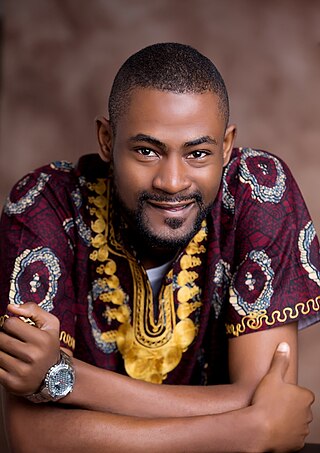
Otosirieze Obi-Young is a Nigerian writer, editor, culture journalist and curator. He is editor of Open Country Mag. He was editor of Folio Nigeria, a then CNN affiliate, and former deputy editor of Brittle Paper. In 2019, he won the inaugural The Future Awards Africa Prize for Literature. He has been described as among the "top curators and editors from Africa."
Glenna Gordon is an American documentary photographer, photojournalist, editor, and educator based in New York City. She is known for documenting such event as the Ebola outbreak, ISIS and Al Qaeda's hostage situations, and the kidnapping of more than two hundred and fifty Nigerian school girls. She is also known for her documentation of Nigerian weddings. Her work has been commissioned by The New York Times Magazine, Time, The Wall Street Journal, and Smithsonian. Gordon is an adjunct professor at the New School in New York City and an editor at Red Hook Editions.
Tremor is a 2023 novel by Nigerian-American author Teju Cole.














